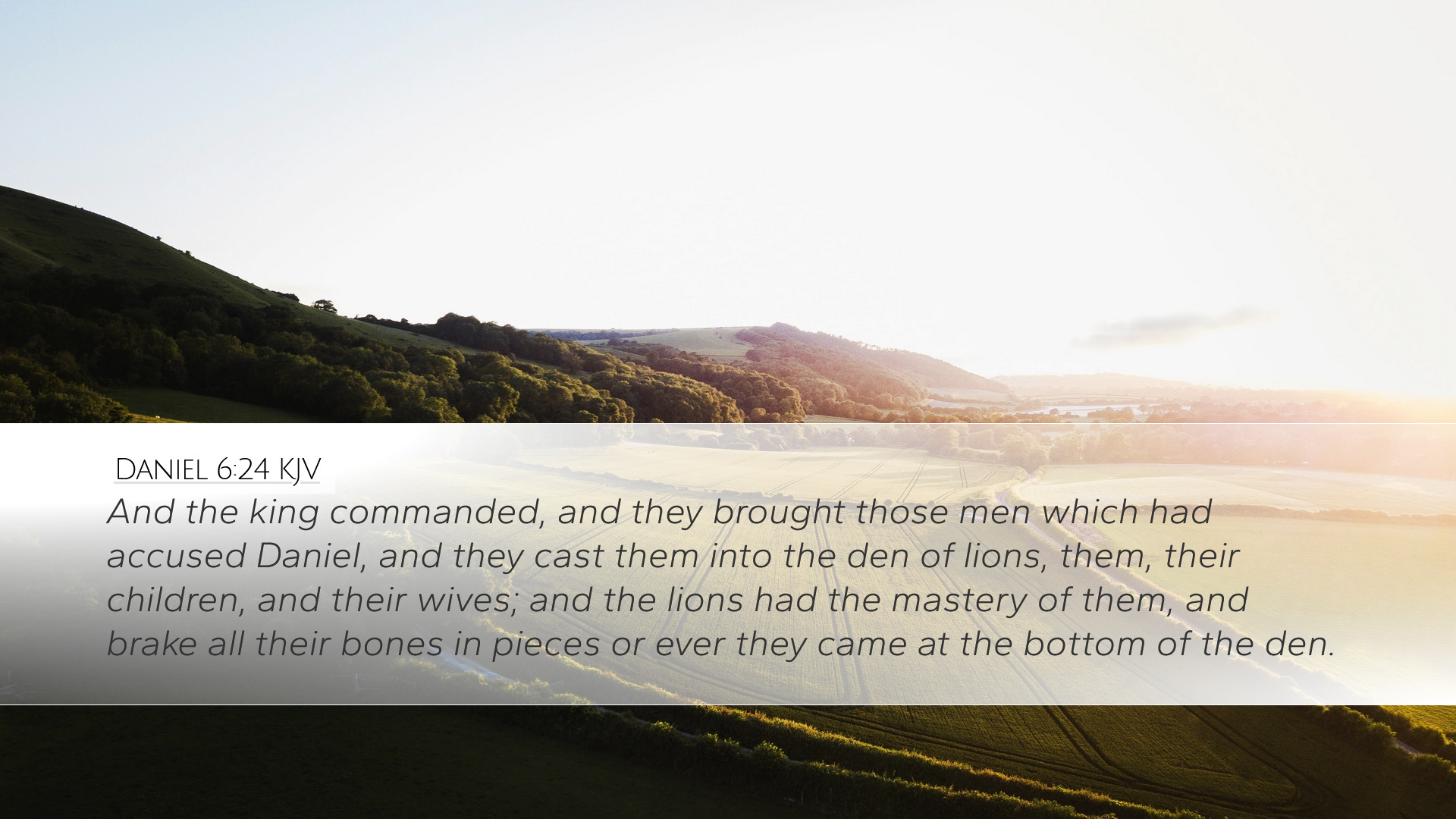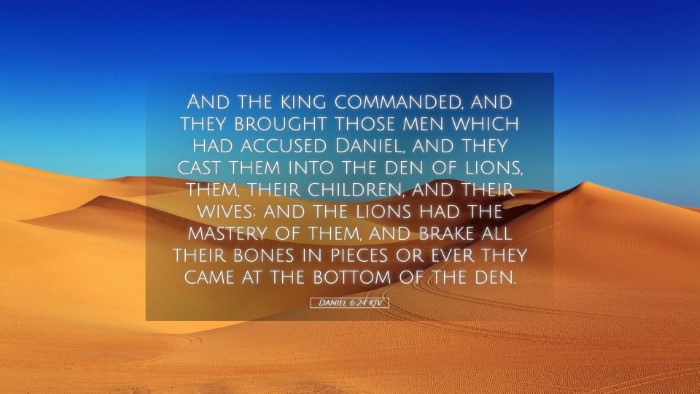Commentary on Daniel 6:24
Verse Reference: Daniel 6:24 - "And the king commanded, and they brought those men which had accused Daniel, and they cast them into the den of lions, them, their children, and their wives; and the lions had the mastery of them, and brake all their bones in pieces or ever they came at the bottom of the den."
Introduction
This verse marks a critical moment in the narrative of Daniel's deliverance and the judgment that follows against the conspirators who sought to destroy him. The punishment meted out stands as a stark reminder of the consequences of wickedness and an amplification of God's protection over His faithful servants. The resonance of this passage extends beyond its immediate context, echoing through themes of justice, divine deliverance, and the sovereignty of God.
Contextual Overview
The backdrop of Daniel 6 reveals a political intrigue where Daniel, a Jew in exile, rises to prominence in the Babylonian kingdom under King Darius. His excellence incites jealousy among the other officials, leading them to conspire against him. They manipulate the king into issuing a decree that serves as a trap, knowing that Daniel would not compromise his faith by ceasing his prayers to God. The resultant drama culminates in Daniel's miraculous survival from the lions' den, illustrating God’s providential care for those who are faithful.
Insights from Public Domain Commentaries
Matthew Henry's Commentary
Matthew Henry emphasizes the divine justice demonstrated in this passage. He notes that though the edict of the king led to Daniel’s peril, it ultimately resulted in the exposure and punishment of the false accusers. Henry argues that this serves as a powerful lesson about the eventual triumph of truth and virtue over deceit and malice.
- Retribution for Evil: Henry points out that the fate of the conspirators, who sought Daniel's death, illustrates the principle of retribution. They faced the very peril they intended for Daniel.
- Divine Sovereignty: The commentary draws attention to God’s sovereign ability to turn evil plots against themselves, manifesting His justice.
- Family Consequences: Henry remarks upon the inclusion of the conspirators' families in their punishment, highlighting the serious nature of corporate responsibility and the far-reaching effects of sin.
Albert Barnes' Notes on the Bible
Barnes provides a detailed examination of the social and historical implications of the punishment. He highlights that the execution of the conspirators in such a barbaric manner was characteristic of ancient Near Eastern justice systems.
- Capital Punishment: Barnes addresses the king's decision to execute not only the accusers but also their families, stressing the severity of the penalty for those who endanger innocent lives.
- Lions as Instruments of Judgment: He reflects on the lions as symbols of divine judgment, consistent with animal imagery throughout Scripture representing danger and divine discipline.
- Cultural Context: The commentary elaborates on the customs of the time regarding punishments, indicating a brutal form of justice that serves as a warning against injustice and vilification.
Adam Clarke's Commentary
Adam Clarke examines the moral narrative surrounding Daniel's ordeal, suggesting that the trials he faced were not merely punitive, but also pedagogical in nature.
- Lesson on Integrity: Clarke posits that Daniel's adherence to his principles under pressure served as an inspiring example for all believers regarding integrity and steadfastness in faith.
- Wickedness Punished: He sheds light on the moral law that governs societies, indicating that those who work iniquity are ultimately punished, thereby reaffirming the belief in divine oversight.
- Hope for the Faithful: Clarke underscores the narrative's encouraging aspect for believers facing trials, affirming that God will ultimately vindicate the righteous.
Theological Themes
This verse and its context present several underlying theological themes worthy of exploration:
- Divine Justice: The swift justice that befalls the wicked provides a powerful testimony to God’s righteous judgment.
- Faith vs. Fear: Daniel’s unwavering faith serves as a contrast to the fear of the conspirators, emphasizing reliance on God’s protection over earthly consequences.
- The Sovereignty of God: The unfolding events, despite appearing chaotic, beautifully illustrate the sovereignty of God, who works through human actions to fulfill His divine purposes.
Application for Today
As church leaders, students of Scripture, and theologians reflect on Daniel 6:24, several applications emerge.
- Encouragement in Trials: This passage serves as encouragement that God honors faithfulness, and trials may lead to divine intervention.
- Awareness of Justice: It calls for an awareness of divine justice and the societal responsibility to uphold righteousness.
- Integrity in the Face of Opposition: Believers are reminded of the importance of maintaining integrity and trusting in God’s plan, even when faced with injustice.
Conclusion
Daniel 6:24 encapsulates a profound moment in biblical history where truth prevails over malice, emphasizing God’s faithfulness to those who remain steadfast in their faith. The insights from the commentaries deepen the understanding of the passage’s implications, offering rich lessons for theological reflection and practical application. Encountering this narrative invites believers to consider the depth of God’s sovereignty, the inevitability of justice, and the enduring call to integrity amidst trials.


